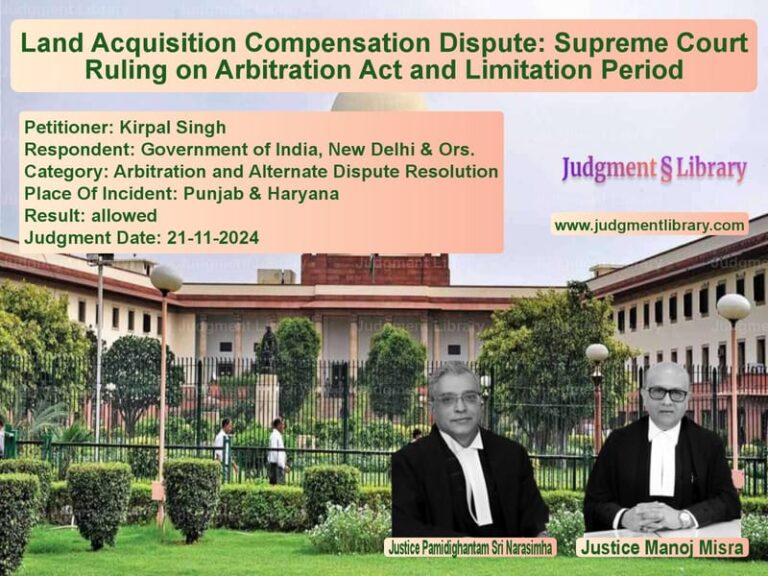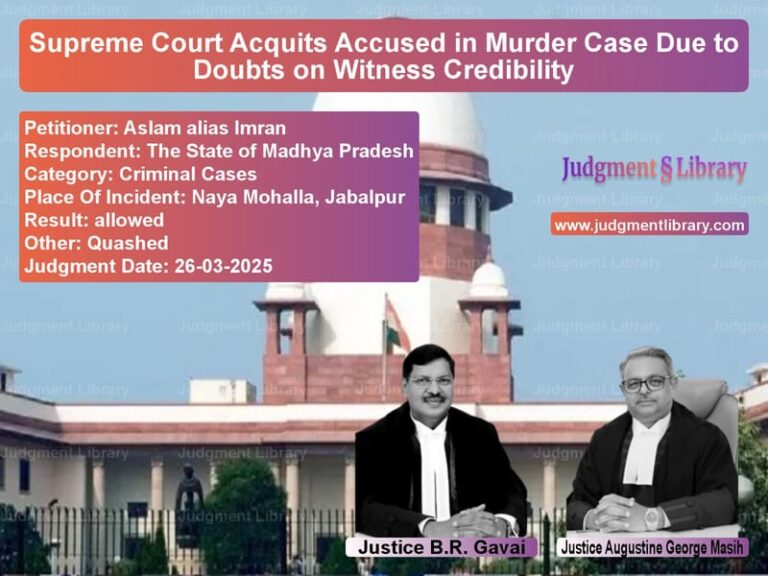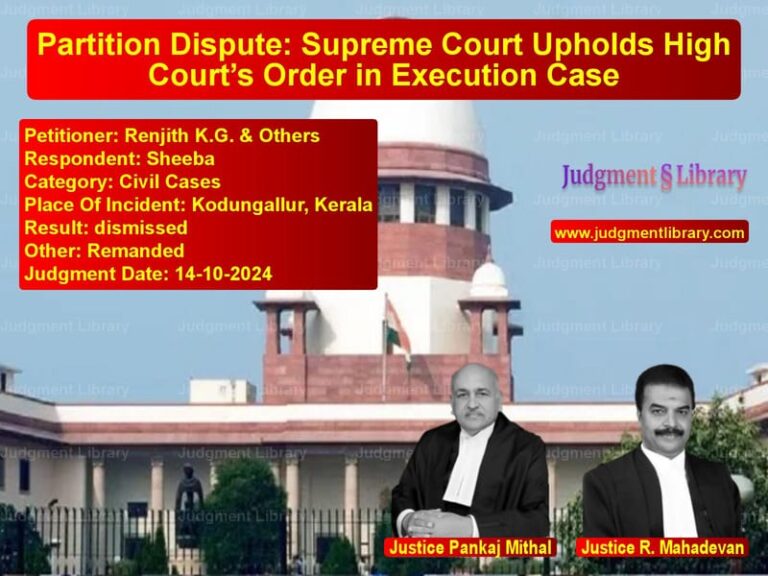Legal Analysis of Pradeep Bisoi Case: Conviction and Appeal Under IPC Section 304 Part II
The case of Pradeep Bisoi vs. The State of Odisha is a significant judgment in Indian criminal law, dealing with serious offenses including an acid attack, bomb explosion, and grievous injuries leading to death. The accused, Pradeep Bisoi, was convicted under Section 304 Part II of the Indian Penal Code (IPC) and sentenced to five years of rigorous imprisonment. The case, originating from the Trial Court and later heard in the Orissa High Court, was eventually brought before the Supreme Court of India, where the conviction was upheld.
This case highlights the importance of dying declarations, the legal principles governing their admissibility, and the interpretation of circumstantial evidence in a criminal trial. The court deliberated on crucial legal aspects, including the admissibility of a statement recorded under Section 161 Cr.P.C. as a dying declaration under Section 32 of the Indian Evidence Act.
Background of the Case
On 28th November 1990, the victim, Bhaskar Sahu, was riding his bicycle near the Belapada bridge when he was allegedly attacked by the accused, Pradeep Bisoi, and his associates. The attack was brutal and premeditated:
- A bomb was thrown at the victim, hitting his right leg and causing him to fall.
- As he attempted to flee, the accused chased him and struck him with a kati (a sharp weapon) on his right shoulder, causing him to collapse.
- The accused then poured acid on the victim’s head, face, and chest, inflicting severe burns.
The victim, critically injured, was transported to Berhampur Medical College by his brother and villagers. He survived for nearly four months before succumbing to his injuries on 25th March 1991. The First Information Report (FIR) was lodged under multiple IPC sections, including 324, 326, 286, and 34.
Trial Court Proceedings
The prosecution presented a detailed case supported by eyewitness accounts, forensic evidence, and medical reports. The key prosecution witnesses included:
- PW1 (Informant) – Brother of the deceased, who provided crucial details about the attack and identified the accused.
- PW2 and PW3 – Witnesses who corroborated the sequence of events.
- PW4 (Investigating Officer) – Conducted the investigation, gathered forensic evidence, and recorded statements.
The deceased’s statement, recorded on 5th December 1990, played a pivotal role in the case. The trial court held that the statement was admissible as a dying declaration under Section 32(1) of the Indian Evidence Act since it detailed the circumstances leading to his eventual death. The court observed:
“The deceased had acid injuries as well as bomb blast injuries. In the acid attack, he lost his eyesight and also lost his right foot. The statement of the deceased recorded on 05.12.1990 is admissible under Section 32(1) as it relates to his cause of death.”
The trial court convicted the accused under Section 304 Part II IPC and sentenced him to five years of rigorous imprisonment.
Appeal Before the Orissa High Court
The accused appealed against the conviction, raising the following key arguments:
- There were contradictions in the witness testimonies.
- The victim’s statement recorded under Section 161 Cr.P.C. should not be treated as a dying declaration since he survived for months after the attack.
- The case lacked direct eyewitnesses.
The prosecution countered these claims, emphasizing that:
- The deceased’s statement was consistent and corroborated by medical evidence.
- Section 32(1) of the Evidence Act allows statements related to the cause of death to be admissible.
- The conviction was based on strong forensic and circumstantial evidence.
The High Court upheld the trial court’s judgment, affirming that the conviction and sentence were appropriate.
Supreme Court Judgment
The case was brought before the Supreme Court, where the defense reiterated its arguments. The prosecution relied on landmark judgments, including:
- Mukeshbhai Gopalbhai Barot vs. State of Gujarat – Establishing that a statement recorded under Section 161 Cr.P.C. can be treated as a dying declaration.
- Sri Bhagwan vs. State of Uttar Pradesh – Affirming that a statement recorded before death can be admissible under Section 32(1) of the Evidence Act.
The Supreme Court, after reviewing the evidence, concluded:
“The reliance placed on the statement of the deceased recorded on 05.12.1990 is legally justified. The evidence on record sufficiently establishes the guilt of the accused. We find no merit in the appeal, which stands dismissed.”
Legal Precedents and Significance
The judgment reaffirmed critical legal principles:
- Dying declarations under Section 32(1) of the Evidence Act are admissible even if recorded under Section 161 Cr.P.C..
- Contradictions in minor witness details do not nullify a conviction if substantive evidence supports the prosecution’s case.
- Sentencing under Section 304 Part II IPC is appropriate when intent to kill is absent but knowledge of consequences exists.
Conclusion
The case of Pradeep Bisoi vs. The State of Odisha serves as a landmark judgment in defining the legal validity of dying declarations. It underscores the importance of forensic evidence and witness corroboration in securing convictions. The Supreme Court’s decision to uphold the five-year sentence highlights the gravity of the offense while balancing legal precedents.
Petitioner Name: Pradeep Bisoi @ Ranjit Bisoi.Respondent Name: The State of Odisha.Judgment By: Justice Ashok Bhushan, Justice A.K. Sikri.Place Of Incident: Belapada, Odisha.Judgment Date: 10-10-2018.
Don’t miss out on the full details! Download the complete judgment in PDF format below and gain valuable insights instantly!
Download Judgment: Pradeep Bisoi @ Ranj vs The State of Odisha Supreme Court of India Judgment Dated 10-10-2018.pdf
Direct Downlaod Judgment: Direct downlaod this Judgment
See all petitions in Attempt to Murder Cases
See all petitions in Fraud and Forgery
See all petitions in Theft and Robbery Cases
See all petitions in Judgment by Ashok Bhushan
See all petitions in Judgment by A.K. Sikri
See all petitions in dismissed
See all petitions in supreme court of India judgments October 2018
See all petitions in 2018 judgments
See all posts in Criminal Cases Category
See all allowed petitions in Criminal Cases Category
See all Dismissed petitions in Criminal Cases Category
See all partially allowed petitions in Criminal Cases Category







